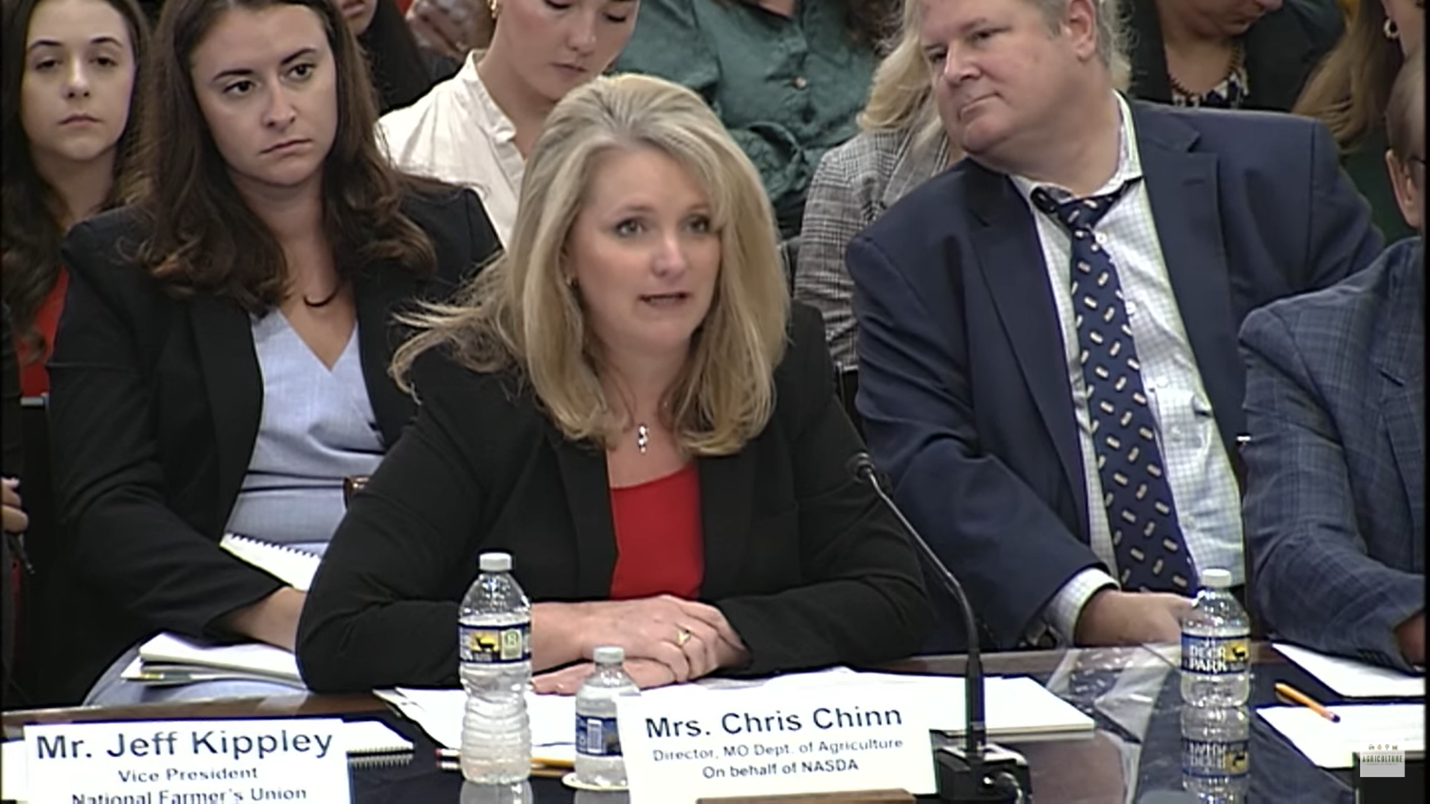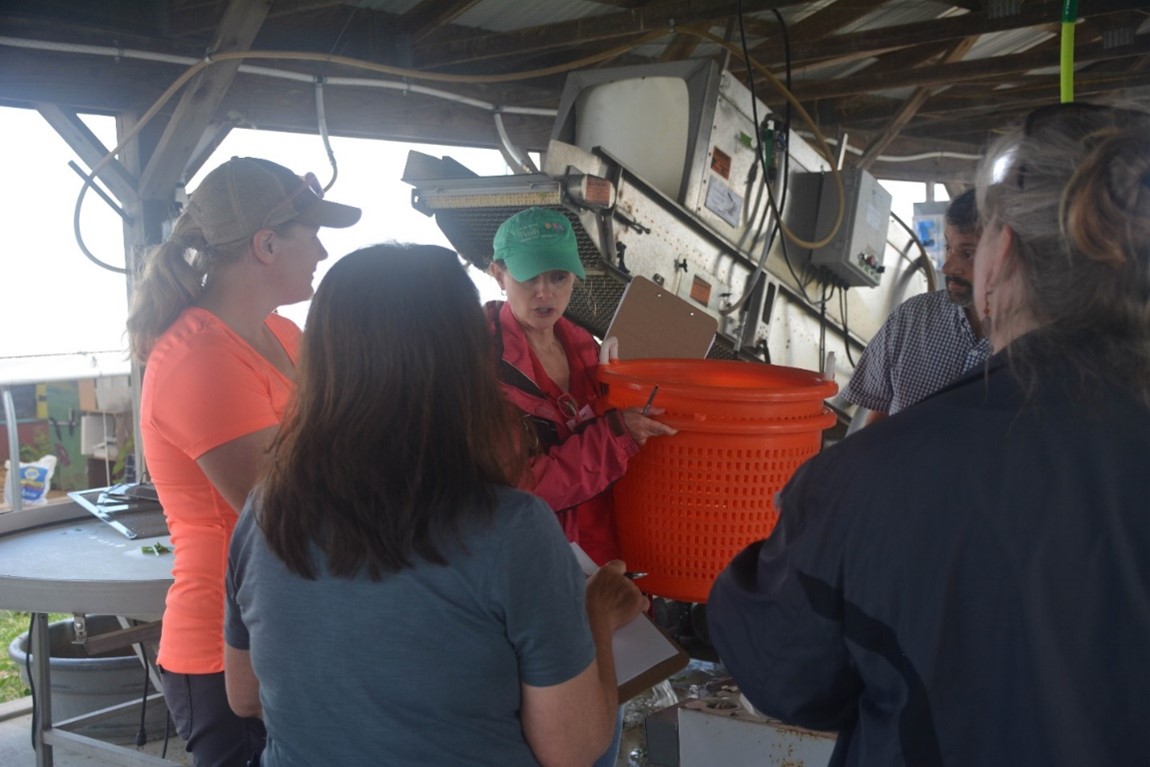The National Association of State Departments of Agriculture has been a leader in the nation’s most important agricultural issues since 1916 and continues to give a voice to agriculture across the U.S. NASDA works daily to fulfill its mission of enhancing American food and agricultural communities through policy, partnerships and public engagement.

NASDA members pictured at Nationals Park in Washington, D.C. during the 2024 Winter Policy Conference.
NASDA members: Leaders in agriculture
The organization represents the departments of agriculture in all 50 states and four U.S. territories. Each member is either an elected or appointed official, typically the state’s secretary, commissioner or director of agriculture. This structure allows NASDA to operate at the nexus of federal and state agricultural policies, ensuring that state-level concerns and innovations are represented in national dialogues. NASDA’s influence and actions impact the agricultural industry on the state, national and global levels as the organization works to influence policy that provides economic development opportunities and community benefits for all regions, people and environments.

NASDA Board Member and Missouri Agriculture Director Chris Chinn testifies on behalf of NASDA before the U.S. House Committee on Agriculture in July 2024.
NASDA is governed by a 10-member board of directors that ensures all NASDA programs and initiatives are aligned with the organization’s mission and effectively serve the interests of its member states. The board consists of a five-member executive committee, one at-large member and the presidents of the four NASDA regions.
NASDA regional associations operate in the Midwest, Northeast, South and West. These regional associations are designed to facilitate collaboration, advocate for regional interests and provide a platform for information sharing. This helps states address common issues, share best practices and resources and develop regional strategies for agricultural advancement and policy. During emergencies such as animal disease outbreaks or natural disasters, this collaboration is critical for effectively influencing national agricultural policy and securing federal support for regional needs. By focusing on regional collaboration and advocacy, NASDA’s regional associations help to strengthen the overall agricultural sector in the U.S., ensuring that state departments of agriculture can effectively support their local agricultural communities.
NASDA staff: Amplifying the voices of state departments of agriculture
In addition to NASDA members, NASDA staff perform critical functions daily to advocate for policies, promote partnership and collaboration and represent its members in our nation’s Capital and beyond.
The policy team plays a crucial role in the operation of NASDA, aiming to achieve sound policy outcomes to enhance agriculture across America. Each year, NASDA staff work with members to determine the most critical agricultural issues across the U.S. to prioritize. The 2024 policy priorities emphasized by NASDA members and focused on by the NASDA policy team are the farm bill, food safety, labor reform, pesticide regulations and PFAS. By representing state-level interests at the federal level, NASDA promotes agricultural policies that support agriculture throughout the entire supply chain, ensuring a safe and affordable food supply for all.

NASDA NASS Director Charlie Ingram and NASDA Enumerator gather agricultural data during field work.
Another focus for the NASDA team is gathering reliable, accurate data to inform decisions in the agricultural industry. Since 1972, NASDA has partnered with the U.S. Department of Agriculture’s National Agricultural Statistics Service to employ about 2,400 enumerators nationwide. The agricultural statistics collected through this cooperative agreement are essential for planning and administering federal and state programs. Farmers, ranchers and others in agriculture rely on this information for production, supplies, prices and more. Crucial reports, such as the Census of Agriculture, provide data vital for maintaining a strong agricultural economy, guiding investment strategies, making production decisions, and fostering international trade. In 2024, NASDA and NASS launched a strategic plan to upgrade and strengthen operations, aiming to provide more robust statistical services and continue supporting the growth and sustainability of the agricultural sector.

NASDA staff pictured at the 2024 A Taste of the States: Chicago trade show.
Through another cooperative agreement, NASDA has partnered with the USDA Foreign Agricultural Service for more than 40 years, supporting small-to-medium-sized food and beverage businesses and boosting exports of U.S. agricultural products. With this partnership, NASDA has connected U.S. food product companies with qualified buyers through more than 40 trade show events in the U.S., creating valuable export opportunities. Recently rebranded to A Taste of the States, NASDA annually hosts these trade show pavilions at the National Restaurant Association Show in Chicago and America’s Food and Beverage Show in Miami, giving state departments of agriculture a platform to promote products and businesses from their states. NASDA members play a crucial role in helping small businesses from their states reach new markets, and events like NASDA trade shows provide the exposure and connections needed to expand their reach globally.
In addition to hosting trade show pavilions, the NASDA trade team also spearheads trade missions, leading NASDA members and partner organization experts to countries in Africa and Asia, and beginning in 2024, Latin America and the Caribbean. The goals of NASDA’s trade missions are to build relationships, reduce non-tariff trade barriers and promote collaboration for the advancement of agriculture globally. In 2024, NASDA was awarded $5 million through the USDA Foreign Agricultural Service Regional Agricultural Promotion Program, which aims to diversify market opportunities for U.S. food and agricultural products by expanding markets beyond the top regions where U.S. food and agricultural products are currently exported. Through this funding, NASDA will continue to build upon relationships established during previous trade missions while maintaining and improving market access and expanding export opportunities for small and medium-sized U.S. food and beverage companies.
Through partnerships, policy and public engagement, NASDA’s staff is committed to serving state departments of agriculture.
NASDA Foundation: Serving agriculture through education and research
The NASDA Foundation is a critical branch of NASDA, working as the only educational and research organization that directly serves the nation’s state departments of agriculture. Aligning itself with NASDA’s priorities, the Foundation supports ongoing state initiatives and member priorities through cooperative agreements, funding programs and outreach to local communities.
The Foundation’s core projects, led in collaboration with USDA funders, emphasize the unique role that NASDA can play as both a convener and implementation partner of state departments of agriculture. Between the NASDA Foundation-led EPA Historically Underserved Farmers Grant Program and Northeast Regional Food Business Center, the team has established working groups and assembled regional summits with over 17 states, dozens of community partners and hundreds of local producers.

Participants of an On-Farm Readiness Review training session at one of Michigan State University’s research farms learn about spotting food safety risks on the farm and how to communicate those risks to farmers.
Through one of these projects, the Foundation partners with the U.S. Food and Drug Administration to ensure and champion the safety of produce and animal feed food systems in the U.S. As part of that partnership, the NASDA Foundation has a cooperative agreement in which it works with FDA and state agencies to produce and distribute tools that assist in implementing produce safety rules within the Food Safety Modernization. The FDA and NASDA Foundation partnership serves as the foundation for effective regulatory policy and this program helps farmers ensure that food safety contributes to solving the challenge of feeding the increasing world population.
In close collaboration with state departments of agriculture and industry partners, the Foundation leads several educational initiatives that reach a broad and diverse audience – from small business owners to college students and young professionals. Programs like the Farm2Food Accelerator, which launched its first cohort of Spanish-speaking food entrepreneurs last year, remain at the forefront of a growing movement to provide equitable and accessible educational resources to all food and farming communities.
Conclusion
As the agriculture sector continues facing complex challenges and embracing opportunities, NASDA stands as a vital advocate and unifier in the industry. By bridging the gap between state and federal policies, promoting sustainable practices and supporting rural economies, NASDA ensures that American agriculture remains resilient, productive and forward-looking.
###
NASDA is a nonpartisan, nonprofit association which represents the elected and appointed commissioners, secretaries and directors of the departments of agriculture in all 50 states and four U.S. territories. NASDA grows and enhances American food and agricultural communities through policy, partnerships and public engagement. To learn more about NASDA, please visit www.nasda.org.
The NASDA Foundation is the only educational and research organization that directly serves the nation’s state departments of agriculture. The NASDA Foundation’s mission is to enhance American food and agricultural communities through education, outreach and research. The NASDA Foundation works with states to nourish people and communities while serving as the stewards of the environment and public trust. To learn more about the NASDA Foundation, please visit nasda.org/nasda-foundation/.

